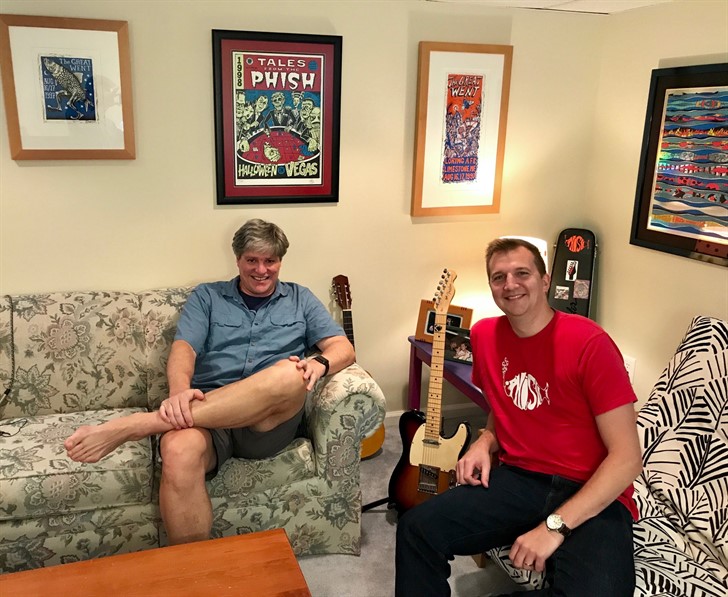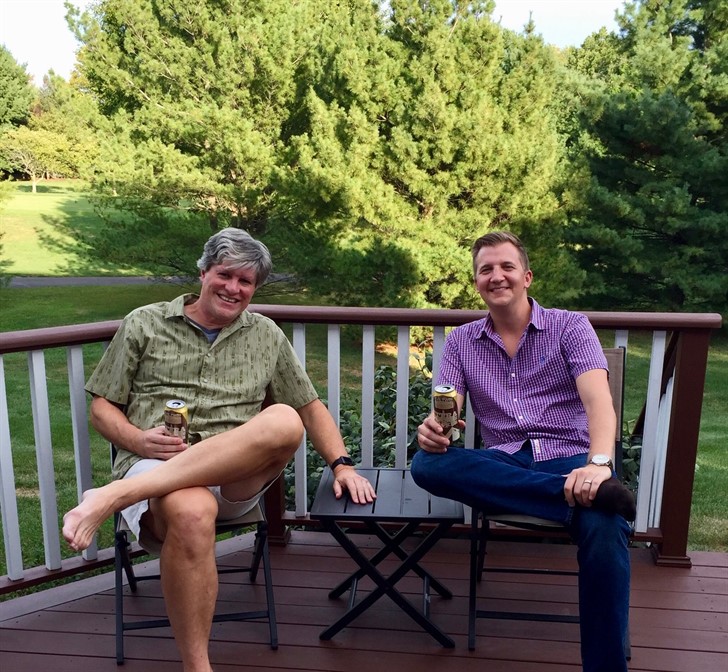Interview: Tom Marshall and RJ Bee on New Podcast Network Osiris

“I’ve been privileged to be with Phish as they grew from having two people in the audience to 75,000, and I’ve seen how fans have given back to the band in different ways and to the community,” says longtime Phish songwriter Tom Marshall as he traces the origins of his popular podcast, Under the Scales. “Those are the fans I want to interview—they not only have juicy stories, but they have also given something back to the band.”
Marshall is currently sitting in an office usually reserved for video sessions at Relix’s New York headquarters talking about the digital project he’s on the verge of launching with Helping Friendly Podcast host RJ Bee. Two of the best-known podcasters tracking the Phish scene, Marshall and Bee met two years ago and started talking about, as Bee says, “how we could bring more music content to more people, and how we could spend more time thinking and talking about music.”
The result of those conversations is Osiris, a new partnership with Relix that will bring a veritable arena-section of likeminded music podcasters into a single network. Osiris’ name is taken from a line in “Guelah Papyrus,” an old-school Phish composition that Marshall wrote with Trey Anastasio, and his goal is to share resources with other podcasters, focusing on deep conversations and critical analysis of bands both in and outside of the jamband scene. (“It rolls off the tongue, even though it’s the Egyptian lord of the underworld,” Marshall says with a laugh of the network’s name.”)
“Tom came up with the code name ‘Osiris’ and that’s how we referred to the project, and it stuck,” Bee says. “We’ve come in contact with a lot of artists, managers and others seeking to engage more authentically with fans and with the community. So it’s this coming together of fans who care about the music so much that they’re willing to listen to an hour-long discussion, companies who are trying to connect with fans in a less generic ways and artists who are trying to engage with their audiences in more organic ways.”
Osiris is set to officially launch early this year and will be a visible presence both online and at a variety of live music events in the coming months. (Look for a Relix-branded podcast featuring Marshall, Bee and members of our editorial team in the near future, too).
“We’ve brought together some amazing podcasters who have put in a ton of work building their own unique, music podcasts,” Bee says. “These podcasts are the foundation of the Osiris community, which will connect passionate music fans with more content about the music and artists they love.”
Marshall admits, “I did three episodes a month for one year and was unable to become attractive to advertisers, even though I had a million downloads. And I thought: ‘Rather than being told this door isn’t open to you, let’s get 10 of me together.’ The cool thing about us is that we’re laser-focused on music and there’s a lot of people that want to talk to music fans.”

You host two of the more prominent podcasts in the Phish space. What led you to starting your own shows?
RB: I started Helping Friendly Podcast in 2013. I had no idea how to set it up; I had no idea about the technology. But I’d been listening to podcasts for a long time, so our idea was to bring the fan perspective in. There wasn’t a podcast that just talked about Phish. To me, the Phish community had always been a bit hierarchical, and the people who had been around for a long time controlled the conversation to a certain extent.
In 2013, there were all of these blogs and other things that were bringing in a new perspective. Our idea was to highlight different Phish fans’ experiences and then get into the music in a lot of detail. My co-host Brad TenBrook and I started the podcast, and now there are four of us. We bought a couple of mics and started recording and then figured everything else out as we went. It’s been a very organic growth over almost five years now and an interesting journey—I’ve learned a lot about how to keep audiences engaged and responsive.
TM: I was down in Atlanta from 2014-2016 on a two-year assignment, and Atlanta’s an amazing place for walking—there are all kinds of trails, and I had a friend who was feeding me new music and giving me podcasts to listen to. I was walking five miles every day, just consuming podcasts, until he finally said, “You should do your own podcast.” This coincided with when I moved back to New Jersey, and RJ was one of the first people I bumped into. At the time, the only other Phish podcast I knew of was Harris Wittels’ Analyze Phish. I totally flipped out about that one. I loved it, but he’d recently passed away. Had Harris continued Analyze Phish, I probably wouldn’t have done Under the Scales. I wouldn’t have thought there was a space for it.
When I met RJ, I thought there was an opportunity for him to say, “Oh, shit. Tom Marshall is gonna join the fray here—we’re gonna be enemies,” and instead, we became friends. RJ analyzes the shows and I analyze the culture. In my dreams, I thought I would be talking with Trey three times a year, and Mike three times a year, and Page and Jon. So far, I’ve only spoken to Trey once and I haven’t even spoken to the other guys. [Laughs.] I co-interviewed Trey with Dan Kanter, who was Justin Bieber’s guitarist, and the topic was guitars. Dan and I each had 20 questions, in order of importance, and we got through one question. Trey just talked for two hours with very little prodding needed—he’s that kind of guy—and he gave me enough material for two podcasts.
I had no idea what I was doing early on, so the quality is hard for me to listen to because I learned all these techniques along the way. I talked to Lenny Stubbe, one of the early Phish recorders, for our taper episode. He came over from the Dead world and that episode had a beneficial ripple effect across the community. Dickie [Richard Glasgow], Phish’s tour manager, called me up and said, “Where was he lined up when he wasn’t being treated nicely by the staff?” I thought I was getting Lenny in trouble because when Dickie calls me, I’ve usually gone onstage uninvited or I’ve parked in the wrong place and caused some havoc. But instead, Dickie made it a lot easier for them to get taping tickets again. I like to feel that Under the Scales has done some good for the scene.
Phish was famously one of the first bands to benefit from the internet and remains part of the social media conversation. What about the band’s music is so well suited for the podcasting age?
RB: To me, Twitter is now its own Phish channel; that’s where people are able to get their voice out there and get a lot of information. That’s helped to democratize things quite a bit. Podcasting, specifically, is good for fans of bands like the Dead and Phish because there’s a vast catalog, so you almost never run out of content or things to talk about. It also appeals to the OCD nature of a lot of Phish fans who can endlessly obsess about a specific show or even a specific song. One of our more popular episodes is when we went back and looked at different versions of “Tweezer” from the time it started until now. When you think you’re too far in the weeds, you’re probably in the right place because podcasts are so niche. Beyond Phish and the Dead, there’s untapped potential for podcasts with almost any up-and-coming band that has a following and an engaged fanbase—from Twiddle to any other band that you could name.
Our network started off with Under the Scales and Helping Friendly Podcast and slowly grew organically. There’s a Grateful Dead-focused podcast called Brokedown Podcast and Beyond the Pond, which introduces people to music that’s similar to specific Phish jams or years of the band. We’ve sort of been expanding from our core, and now we’re adding people like Ira [Haberman], who hosts and founded The Sound in Toronto. He’s interviewed everyone from Neal Casal to members of Trey’s band and various indie musicians. The power of this network is that we’re bringing in people who are already passionate podcasters.
Our broader vision is to offer music fans a way to engage with music and artists online and offline. We also want to draw connections between artists, venues, festivals and the broader music ecosystem, including companies that appeal to those fans’ interests.
TM: Obsession for detail—that’s a common theme I’ve noticed with Under the Scales that I wasn’t expecting. A lot of people mention that when you’re at a show, you’re not really interacting with your friends; you’re just absorbing. So a big part of the enjoyment of the show is getting there—meeting your pals and chilling before the show starts. Phish fans in particular still want to analyze after a show: “What was the best song of the night? What set was the best? What show was the best of that run?” That was interesting to me because I don’t really go back and listen to the old stuff unless it happens to just come up on my phone as I’m playing music.
RB: For me, the Phish experience is 50 percent about the music and 50 percent about the community. Maybe the ratios are different for different people, but it is about the community. One interesting thing we’ve learned is that, whenever we interview someone about their Phish experience, they tell us when they started seeing the band and go through their whole history. And then there’s a point in the conversation where they break through the Phish fandom and stats to what the band and community has meant to their lives. You start with the surface and you peel back the layers of the onion to reveal that they met their future husband or wife at a show, or were recovering from some illness.

Podcasting has been around for almost 15 years, but seems to have reached a level of renewed interest recently. How widespread is the medium at this point? TM: It seems like, below a certain generation, everyone knows what a podcast is at this point. My mom still really can’t figure out how to listen to Under the Scales. She’ll call me and wants to hear the show because my family has been talking about my recent interviews, so I have to explain it to her: “Think of it as a radio show that you can turn on, turn off and pause.”
RB: I get self-conscious because we just talk for hours about this one band and then play their music. It’s not a general-interest podcast. But like I was saying earlier, that’s the point of these podcasts. Podcasts are much more niche and targeted. I encourage people who ask about starting a podcast to be as specific as they can. There are thousands of podcasts out there, but a lot of them focus on one thing. We just heard about one that gets tons of downloads, and it’s about a single comic book.
TM: I would ask these veterans how many shows they had seen. I had theorized that everyone who had seen 300 or more Phish shows knew each other, at least by face, but further experimentation reveals that number is probably 400.
Tom, your podcast documents the space between the band and their fans. Do you have a favorite anecdote that you’ve heard since launching Under the Scales?
TM: Big Phil is one of my most popular episodes—and I don’t think it has necessarily anything to do with the fact that I called it “Phil and Friends” and included a picture of Jerry Garcia. Big Phil was a friend of Brad Sands, who was Phish’s road manager for a long time. Phil and I are both tall, and Brad would give us front row tickets so he could observe what he would call the “twin towers” and the “cone of disappointment” behind us. He liked that I could only tolerate the angry eyes on my head for about two songs.
Every single time Phil came to a show, he would bring those 50-pound boxes of chocolate covered pretzels from Asher Chocolates in Philadelphia and he dubbed the band every episode of The Simpsons on VHS with the commercials edited out, which was gold at the time for those long bus rides.
He was a taper, and he realized he was staying at the same hotel as the Dead after a show one day. They were still not clued into staying under aliases, so Phil opened up the phone and wired the innards to the taping machine, pressed record, and called every single member of the Grateful Dead and recorded them. The one that made it onto my podcast was his conversation with Jerry. He also had balls of steel, but he wasn’t uncool. He was friendly and forward, and never nervous and just talked to Jerry like, “What do you think your best song was tonight?” In such a salesman fashion, he made Jerry unable to hang up on him, even after he realized he didn’t really need to talk with him.
He has so many great stories. There’s one where Mike Gordon steals all his Vegas money. And another one where he’s sitting around, possibly smoking something after a show in the hotel, [and] Mike Gordon walks into his room. Mike doesn’t say a thing and then walks into the closet, closes the door and just stays in there for 15 minutes, hoping to elicit a reaction. Everyone else is stoned and Mike Gordon—the reason they just drove 200 miles—is in their closet. And Phil’s like, “Don’t let him say anything. Just continue the conversation.” And then Mike walks out and leaves without saying a word.
This article appears in the March 2018 issue of Relix. For more features, interviews, album reviews and more, subscribe here.



















